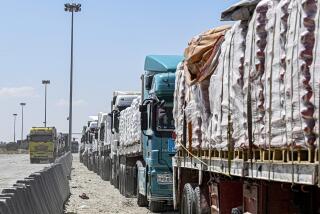Analysts Fear Ethiopia-Eritrea War Will Spread
- Share via
NAIROBI, Kenya — In resuming their costly war over a disputed border region, Ethiopia and Eritrea have further tipped the balance toward political instability, economic decline and social turmoil on a continent already relentlessly afflicted by war, analysts said Friday.
Although the latest cross-border fighting, which erupted last Saturday, is confined to a remote region along a 620-mile border, observers warned that it would be difficult to contain a full-scale war within just these two countries on the Horn of Africa. And with civil wars raging in Angola, Sudan, Somalia, Sierra Leone, the Central African Republic and Congo, efforts to quell the Horn conflict have taken on a sense of urgency.
Already, other regional and international repercussions of the fighting are becoming apparent, analysts said.
Transport costs in the Red Sea, which borders Eritrea and is a strategic waterway for several nations--including Israel, Saudi Arabia, Egypt and Sudan--have started to swell, along with the price of shipping oil from the Middle East to Europe.
Meanwhile, the migration of thousands of civilians displaced from the conflict zone threatens to trigger a humanitarian crisis, according to international relief workers. Dozens of Eritreans opposed to their government have recently sought asylum in Kenya.
Instability in the region has also hit tourism, potentially a major hard currency earner in an area renowned for its rich history, cultural heritage and religious artifacts.
And from a geopolitical perspective, analysts said, the conflict might possibly destroy the anti-Sudan alliance that the U.S. and Israel have been trying to nurture on the Horn.
Eritrea has, in the past, been at odds with Sudan, which might capitalize on the current crisis to woo Ethiopia.
“The war has driven Ethiopia and Eritrea apart and made Ethiopia more amenable to approaches from [the Sudanese government in] Khartoum,” said Richard Cornwell, head of the Early Warning Program at the Johannesburg, South Africa-based Institute for Security Studies.
So far, international appeals for an immediate truce have been ignored while the belligerents continue to trade accusations over who instigated the latest round of battles. The conflict originally erupted in May. At that time, two weeks of fighting left about 1,000 people dead.
Each nation has insisted that it is simply defending its sovereignty. Eritrea gained independence from Ethiopia in 1993 after a referendum and a 30-year war, but the border between the two countries was never formally demarcated.
“The problem here is not real estate for Ethiopia,” Berhane Gebre-Christos, Ethiopia’s ambassador to the United States, said in a recent telephone conversation from Washington. “The problem is the aggression by Eritrea. . . . The war is driven by madness on their side.”
Eritrea, which has been widely viewed as stalling on accepting an agreement that would require it to withdraw from the disputed region, insists the insanity stems from Addis Ababa, its enemy’s seat of government.
“Ethiopia is the aggressor and has always been,” Eritrean Foreign Minister Haile Weldensae recently told reporters in the capital, Asmara.
Though publicly the two countries say they are battling over rights to tracts of remote and mostly uninhabited land, observers said the failure of these onetime staunch allies to forge a peaceful solution seems to indicate a personal rivalry between the countries’ leaders and an ideological divide.
The Ethiopian government has accused its northern neighbor of supporting two of its main political opposition groups and could be trying to teach Eritrea a lesson, analysts said.
Others argued that political unrest, economic hardships and social discontent pushed Eritrea to attack Ethiopia in an effort to distract attention from its domestic difficulties.
Trade relations between the two also have soured recently, with Ethiopian businesspeople complaining about the cost of access to the Eritrean port of Assab, and Eritrea fuming over Ethiopia’s refusal to accept its new currency in cross-border trade.
Foreign military analysts said it is likely that the two foes used the eight-month lull in fighting to replenish their supply of weapons and mobilize more soldiers, and that this could prove catastrophic.
“It looks to be a fairly destructive war,” Cornwell said. “Even though both countries are quite poor, the technology being used is fairly advanced.”
Tanks, helicopter gunships, jet fighters and bombers are among the latest heavy weaponry being used, according to news reports from the battlefields.
The number of casualties from the current round of hostilities is unclear, but both sides claim that their armies have the upper hand and have killed thousands of enemy soldiers.
U.N. envoy Mohamed Sahnoun sounded a dire warning while he was in the region last week seeking a diplomatic solution. He told reporters that “the military buildup on both sides has reached such a proportion that . . . we might be witnessing soon the first high-tech war in Africa.”
More to Read
Sign up for Essential California
The most important California stories and recommendations in your inbox every morning.
You may occasionally receive promotional content from the Los Angeles Times.














